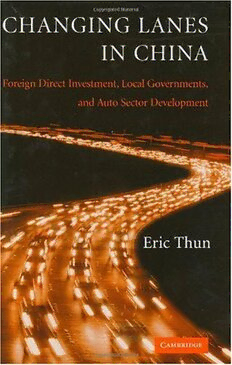
Changing Lanes in China: Foreign Direct Investment, Local Governments, and Auto Sector Development PDF
346 Pages·2006·1.956 MB·English
Most books are stored in the elastic cloud where traffic is expensive. For this reason, we have a limit on daily download.
Preview Changing Lanes in China: Foreign Direct Investment, Local Governments, and Auto Sector Development
Description:
This book addresses two of the most important trends in political economy during the last two decades--globalization and decentralization--in the context of the world's most rapidly growing economic power. The development of the Chinese auto industry is a classic example of China's efforts to re-make inefficient and technologically backward Chinese firms into powerful national champions, and it is an industry on which many of the world's most powerful multinationals have staked their future. The intent of the book is to provide a better understanding of how local political and economic institutions shape the ability if Chinese state-owned firms to effectively utilize foreign direct investment (FDI), and how these institutions shape the prospects of foreign investment. In a global economy, the author argues, local governments are increasingly the agents of industrial transformation at the level of the firm. Local institutions are durable over time, and they have important economic consequences. Through an analysis of five Chinese regions, the book seeks to specify the opportunities and constraints that alternative institutional structures create, how they change over time, and ultimately, how they prepare Chinese firms for the challenge of global competition.
See more
The list of books you might like
Most books are stored in the elastic cloud where traffic is expensive. For this reason, we have a limit on daily download.
